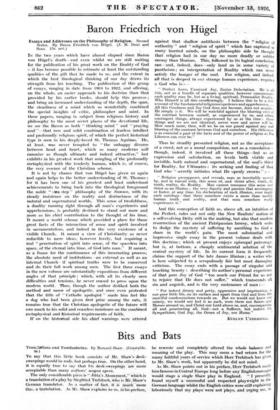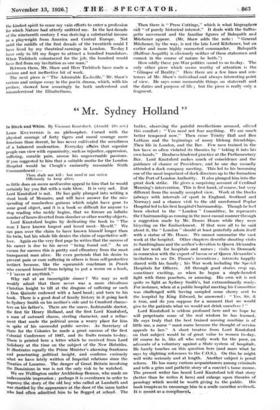Bits and Bats
To say that this little book consists of Mi.. Shaiv's desk- sweepings would be ruife, but perhaps true. On the otherliand, it is equally true to say that his desk-sweepinks. are -more
acceptable than many authors' myna opera. -
. The only considerable piece is " Jitta's Atonement,"w. Melt is a translation of a play by Siegfried .Trebitsch, Mr-. Shaw's German translator. As a mattes' of fact, if is Mach more that_ a translation. As Mr. Shaw exPlainS to us, iichis Preface, he rewrote and completely altered the whole balance and meaning of the play. This may seem a bad return for the many faithful years of service which Herr Trebitsch has given, to Mr. Shaw's work, but apparently he did not mind. As Mr. Shaw points out in hii preface, Herr Trebitsch made him famous in Central Europe long before any English manager would stage a single Shaw play in England. " I presently' found myself a • successful and respected playwright in the German language whilst the English critics were still explaining laboriously that my plays' were not playa, and.-urging me, in
the kindest spirit to cease my vain efforts to enter a profession for which Nature had utterly unfitted me. In the last decade of the nineteenth century I was deriving a substantial income as a playwright from America and Central Europe. Not until the middle of the first decade of the twentieth could I have lived by my theatrical earnings in London. To-day I have only to lift my finger to attract a hundred translators. When Trebitsch volunteered for the job, the hundred would have fled from my invitation as one man." Between them, Mr. Shaw and Herr Trebitsch have made a curious and not ineffective bit of work.
The next piece is " The Admirable Eashville," Mr. Shaw's curious and unique essay in the poetic drama, which, with his preface, showed how amazingly he both understood and misunderstood the Elizabethans.
Then there is " Press Cuttings," which is what biographers call " of purely historical interest." It deals with the Suffra- gette movement and the familiar figures of Balsquith and Mitchener appear. (Mr, Shaw adds the note : " General Mitchener, by the way, is not the late Lord Kitchener, but an earlier and more highly connected commander. Balsquith (Balfour-Asquith) is obviously neither of these statesmen and cannot in the course of nature be both.")
How oddly these pre-War politics sound to us to-day. The only other piece which seems worthy of attention is the " Glimpse of Reality." Here there are a few lines and sen- tences of Mr. Shaw's individual and always interesting point of view. He says some memorable things on statecraft and the duties and purpose of life ; but the piece is really only a fragment.















































 Previous page
Previous page